In the context of a government, democracy does not mean that the citizens of that country must share the same views and opinions. Rather, democracy is a situation whereby all citizens are entitled to their own views yet maintain a healthy level of mutual respect for each other i.e. they agree to disagree. Furthermore, the government of such a democracy should uphold this right to freedom of opinion amongst its citizens and stamp out any attempt at breaching this freedom.
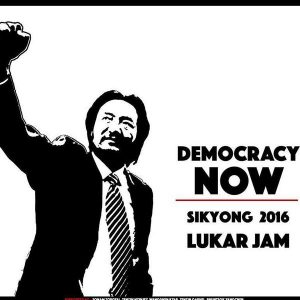
Lukar Jam makes a stand for true democracy in a government ridden with power games and self-interest
The Tibetan refugee nation is one such self-proclaimed democracy. Yet, its leadership, called the Central Tibetan Administration (CTA), continues to violate the core principles of democracy while claiming to be fighting to uphold human rights and individual freedoms. Thus, it comes as no surprise that the majority of the Tibetan people emulate the example of their leaders when it comes to opinions that do not conform to the popular view.
In one such recent example, ex-Sikyong candidate Lukar Jam Atsock published a poetic eulogy to the late Tibetologist Elliot Sperling on Facebook, titled “You are the one who should have lived for 113 years!” Professor Sperling had been possibly the world’s leading historian on Sino-Tibetan relations and an outspoken human rights advocate who championed causes such as that of the Uygur Professor Ilham Tohti. Being vocal against the Chinese government’s transgressions against human rights in Tibet and Mongolia was nothing new to Professor Sperling, and this is what made him so influential to the Tibetan cause.
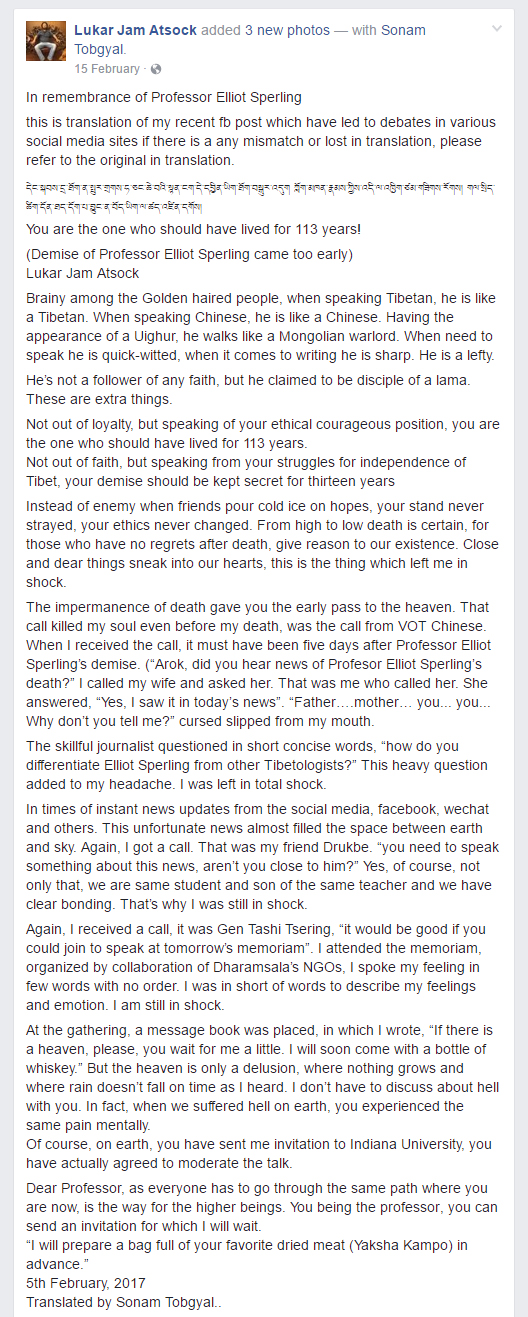
Click to enlarge and read the full post, including the Tibetan composition and the comments. Extracted from https://www.facebook.com/lukarjam.atsock/posts/1425906127420677
Since that Facebook post, Lukar Jam Atsock has received a deluge of criticism for perceived disrespect to His Holiness the Dalai Lama. Although he vehemently denies it, a section of the Tibetan people are adamant that the title of his poem is a reference to the Dalai Lama’s prediction that he will live to 113 years, and that Lukar Jam Atsock is implying that Professor Elliot Sperling should have lived to 113 instead of the Dalai Lama.
He has since become the target of a movement to ostracize him from Tibetan society, with slurs such as “Chinese agent”, “psychopath” and “traitor” hurled at him on the Internet. One restaurant owner went to the extent of refusing to serve him and physically removed him from the restaurant, all because of this perceived insult to the Dalai Lama.
Even the current Sikyong Lobsang Sangay, the elected leader of the Tibetan people, pitched in, making a strongly worded comment against Lukar Jam Atsock’s tribute to his long-time friend in his address during the commemoration of the 10th March ‘Tibetan Uprising Day’ at the Tsuglakhang temple in McLeod Ganj.
Sangay is quoted as saying that the remarks made are,
…objectionable and unfortunate. Such statements sow discord in the Tibetan community and gives reasons for adversaries to rejoice. Although such statements are made on the premise of right to speech, it is unacceptable that such remarks be made to our leader who has since the age of 16 been entrusted with the Tibet’s well being…
It is ridiculous that the Tibetan people are accusing Lukar Jam Atsock, a former political prisoner of China and a Sikyong candidate who championed Tibetan independence during his election campaign, of being a Chinese agent. Lukar Jam Atsock’s election manifesto was strongly against any form of political obeisance to China and his stance has not wavered since then. How then does one make the mental assumption that this post-occupation war hero is in actuality a traitorous Chinese spy?
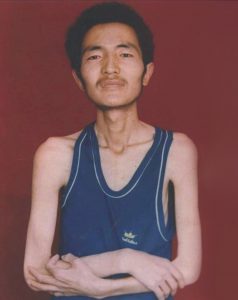
Lukar Jam a few months after his release from Chinese captivity. He has arguably suffered more for his country than many of those currently in power.
Is it because the title of the poem he penned makes a vague reference to the Dalai Lama’s prediction that he will live 113 years?
Is it because one assumes that if Lukar Jam Atsock wishes Professor Elliot Sperling to live to 113 years, it means that he doesn’t want the Dalai Lama to also live to 113?
Isn’t it plausible that Lukar Jam was drawing on the Tibetan belief that 113 is a lucky number?
Isn’t Lukar Jam allowed to use poetic license in his tribute to his friend?
Isn’t it possible for the Tibetan people to express their unhappiness with Lukar Jam Atsock’s poem without calling him a Chinese spy and ostracizing him from society?
Is it because all it takes to be a Chinese spy in the eyes of the Tibetan people is a tiny hint of disrespect to their leaders?
Is this what a democracy is? To be able to express oneself peacefully is an inseparable element of democratic society. And so when a person is denied this basic freedom or is placed at risk of his well-being for exercising his rights under a democracy, then we know that the system of government that he is living under is not a fair and democratic one.
But Lukar Jam’s experience of being targeted for penning a benign poem is not an isolated case. This too is exactly the reaction that Dorje Shugden practitioners receive from the Tibetan people. Never mind that Dorje Shugden’s practice was established over 350 years ago, centuries before the Chinese ever set foot in Tibet. Never mind that Dorje Shugden was the preferred deity of the majority of Tibetans living in Tibet pre-1959. Never mind also that Dorje Shugden is practiced today by people of all nationalities, races, ages and cultures.
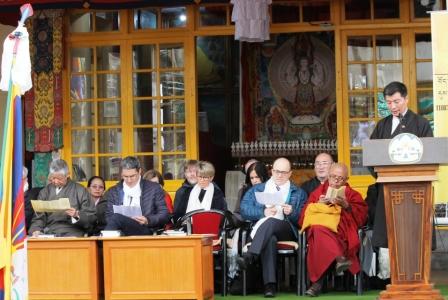
Sikyong Lobsang Sangay at Tsuglakhang temple in McLeod Ganj, where he made strong comments against Lukar Jam’s Facebook post
All it takes is for the Tibetan leadership to baselessly condemn Dorje Shugden’s practice as being a threat to the Tibetan cause and immediately, automatically, all Dorje Shugden practitioners become Chinese spies by default.
It is even more ridiculous that the highest authority in Tibetan governance should see fit to make a comment about an ordinary citizen’s writings that may hint at disrespect to the Dalai Lama. Is he doing it to ruin Lukar Jam Atsock’s budding political career and to eliminate his rival? Doesn’t Sikyong Lobsang Sangay realize that he demeans the stature of his position by making comments on what should be a non-issue? In fact, the Sikyong should be making a statement to calm his people down instead of aggravating the situation further. After all, it is the obligation of a democratic government to protect individuals whose views differ from popular opinion instead of condemning them.
Lukar Jam Atsock’s current predicament just highlights the methods by which the Tibetan leadership seeks to sow fear and control the opinions and actions of their citizens. They isolate those who oppose them and use the China card to make their opposition look like pariahs i.e. anyone whom the Tibetan leadership targets is labeled a traitor and Chinese spy or agent and that is the cue for loyal Tibetans to reject the person. The sad truth is that the majority of the Tibetan people do not realize that as a refugee nation, they are already small in the eyes of the world with shrinking support for the Tibetan cause. The more they divide themselves on the basis of religion, opinion or geographical origin, the weaker their cause is going to be.
The Tibetan leadership is smart enough to realize all this. Yet, they allow it. Why? Because in truth, their leaders are more interested in playing the victim-refugee card and garnering aid from the West than they are in the welfare of the Tibetan people. Amidst questions raised about the effectiveness of Free Tibet campaigns and drastic budget cuts for Tibetan-related causes, individuals within the Tibetan leadership are desperate to collect every last ounce of funding for their personal gain before it dries up completely.
And when it comes to Lukar Jam Atsock, whose election manifesto revolves around sound political thinking as opposed to the hyperbole spouted by the then leaders, the Tibetan leadership are afraid – very afraid – that if Lukar Jam Atsock’s support base grows, their own influence will dwindle considerably as the Tibetan people realize that there is a world beyond blind obedience and loyalty to the Dalai Lama and their Sikyong. They will begin to understand that in truly democratic countries around the world, people are not isolated and ostracized for disagreeing with their President/Prime Minister/King/Queen and that having a different opinion does not mean that you are against the secular/spiritual leader.
Lukar Jam Atsock’s view on Shugden worshippers alone is enough to put the current Tibetan leadership to shame. He says,
To me Shugden is a small issue, but due to the mistaken policies we have made it a big issue, basically we have blown it out of proportion. Shugden is a matter of worshipping a spirit, that too a Geluka spirit. We can’t have a monolithic view of Shugden worshippers. We have to know that there are different types of Shugden practitioners: there are those Shuden practitioners, who openly collude with our enemy, the Chinese government, as revealed by Lama Tseta. Then there are those who quietly practice the deity, while also acknowledging that they believe in the Dalai Lama. We also have to take into account that there are mischievous people harming the Tibetan cause in the name of loyalty to the Dalai Lama, in the name of fighting the Shugden worshippers. We have to have a nuanced, comprehensive policy that will tackle this issue.
This is a relatively well-thought out stance that befits the potential leader of a refugee nation, a leader who appreciates the importance of harmony, tolerance and solidarity in a shattered and dispersed community and one who is willing to risk the ire of those who came before him in order to do the right thing. The Tibetan people sorely need a leader like Lukar Jam Atsock, not one who rides on the coattails of the Dalai Lama.
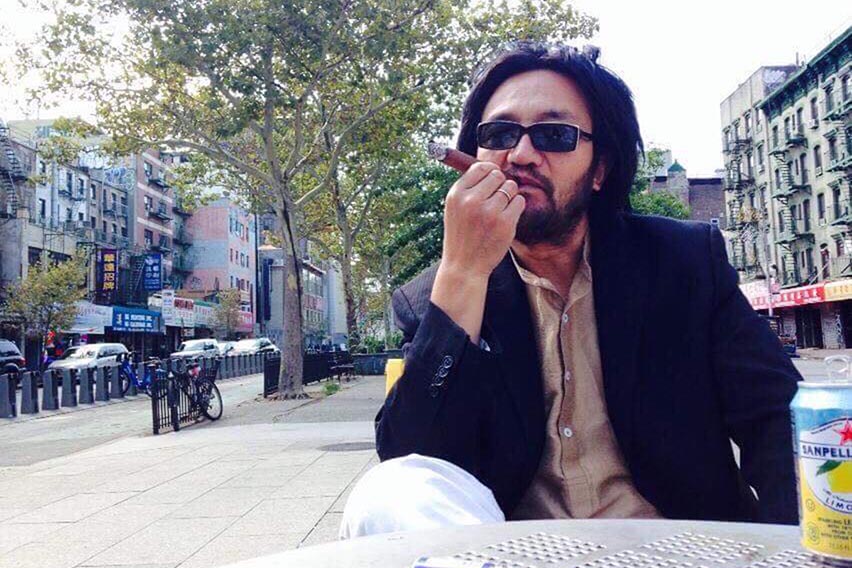
Could Lukar Jam be at the forefront of a Tibetan “revolution” of good governance, public service and transparency?
It is also interesting to note the clear divide in opinion amongst Tibetans on the current controversy surround Lukar Jam Atsock. For instance, the two comments below made by Tibetans living in India highlight the narrow-minded thinking that is endemic to the Tibetan leadership while the two comments made by Tibetans living abroad show the effect of exposure to real democracy and basic human rights.
Here is my view: This is not a criticism at all, it’s a hatred inside, a man with the destructive emotion, mentally ill. Can’t bear the loss of the election, and going totally psychopath. I don’t think he is a poet, or knows how to engage in healthy criticism. To me he devalued the poetic community. It seems like when he can’t fight for freedom he friended with the enemy and begged their terms of freedom.
I think that Lukar Jam is exactly doing what CCP has been trying hard to do for the past decades. That’s to bring down our idol and revile His Holiness. If Lukar Jam has freedom to do or say anything, then I or anyone has freedom to refuse him food at his restaurant 100 times. We shouldn’t give much importance to someone who has been accused of stealing yak and spending time behind bar.
I hope and pray for Lukar Jam and his family’s safety. Given the comments from this thread and other social media, the radical Tibetans may physically harm him using His Holiness name.
We Tibetans seem to have a hard time learning from our past mistakes. This situation with Lukar Jam reminds me of the early seventies when late professor Dawa Norbu was accused of similar critiques of HH in one of his Tibetan Review editorials. The people opposed to his views event went so far as to plan a mob attack to punish him. Despite all that, like the late professor, I firmly believe Lukar Jam is a true patriot. I do not condone his views on His Holiness, but we do not want to lose a good Tibetan, just because he has a tendency to put his foot in his mouth once in a while. As for politicizing the issue, it is a shame that some of our leaders can’t see beyond their sphere of influence and add to turmoil and misinformation that could cause us more harm and give leverage to our enemies.
More recently, a group of students and researchers in exile have written an open letter to those who criticize Lukar Jam Atsock, saying that their actions are unjustifiable and that it is wrong to criticize him in this manner for his artistic expression. The words of these educated academics will definitely carry weight in the Tibetan community. Originally published on tibetsun.com, the letter has since been removed for reasons unknown.
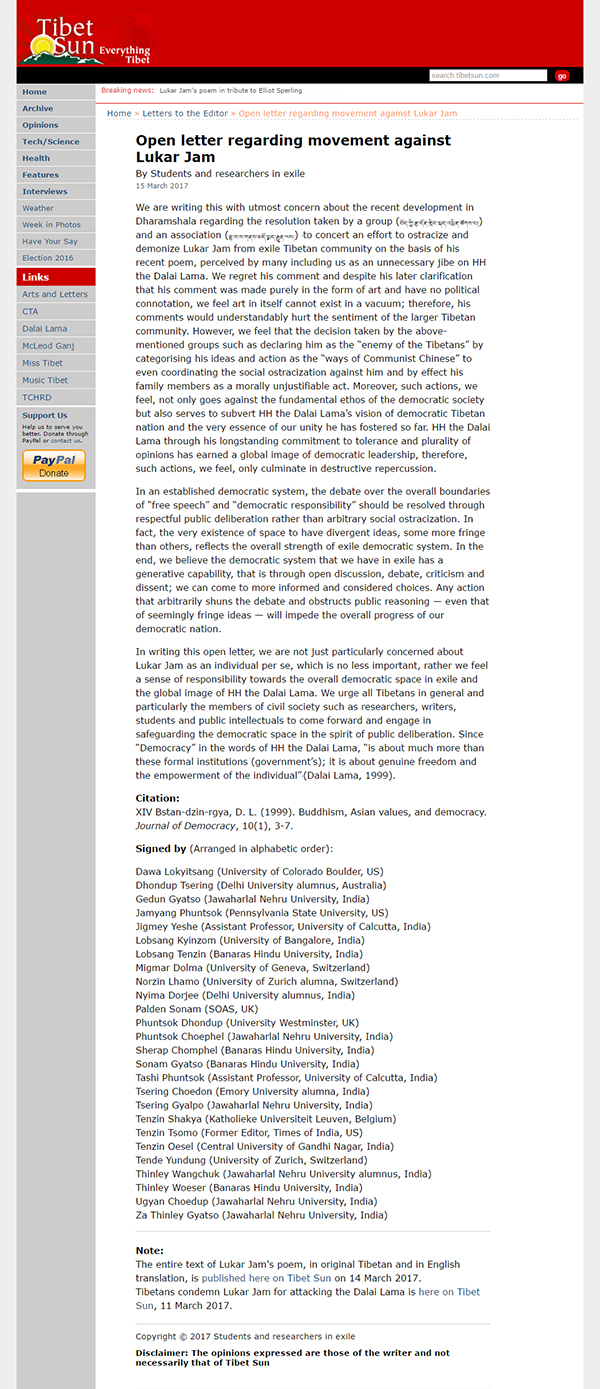
Click to enlarge and read the full letter. Extracted from https://www.tibetsun.com/letters-to-the-editor/2017/03/15/open-letter-regarding-movement-against-lukar-jam-by-tibetan-studentsresearchers-in-exile and also available on http://www.ezspk.co.uk/2017/03/14/open-letter-regarding-movement-against-lukar-jam-by-tibetan-studentsresearchers-in-exile/
Sonam, from USA, also published an open letter directed at Sikyong Lobsang Sangay, in which he condemns the exile government’s lack of support for free speech and requests that they guarantee the safety of Lukar Jam Atsock from vigilante attacks.
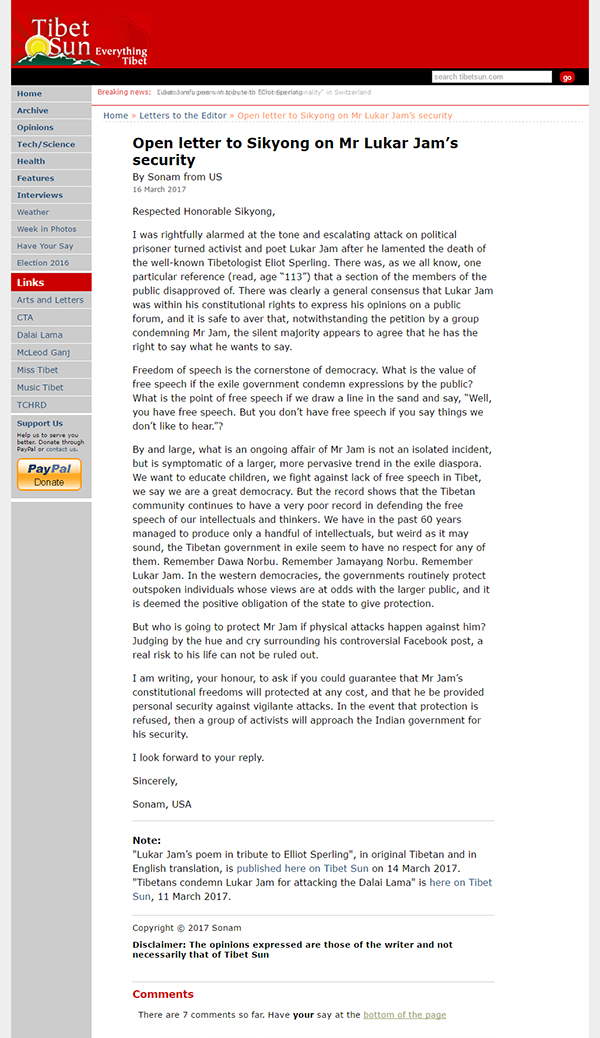
Click to enlarge and read the full letter. Extracted from https://www.tibetsun.com/letters-to-the-editor/2017/03/16/open-letter-to-sikyong-on-mr-lukar-jams-security
It is encouraging to know that there are moderate, educated Tibetans out there who are beginning to realize that it is wrong to ostracize people on the basis of their beliefs and that having a space that accommodates divergent ideas is a reflection of a democracy’s strength.
We can only hope that more and more Tibetans similarly wake up and realize that their government demonizes those who disagree with them and abuses their power and platform to turn public opinion in their favor. And by speaking up against the current Tibetan political situation, the Tibetan leadership will very soon have a serious problem on their hands if they don’t change their ways.
References:
MORE NEWS LIKE THIS